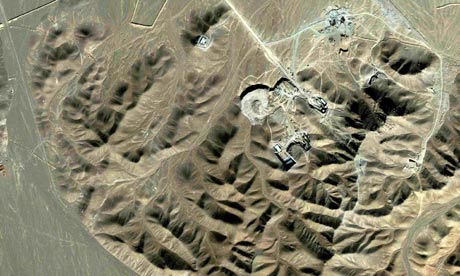
The US and Iran raised the stakes yesterday ahead of this week's nuclear showdown in Geneva, with threats of global strife if no resolution is found.
The sharpened rhetoric followed Friday's revelation that Iran had been building a secret uranium enrichment plant under a mountain near Qom, and it points towards a new wave of sanctions that go far beyond the targeted financial measures imposed on Iran so far.
Speaking at the G20 summit in Pittsburgh, Barack Obama declared: "Iran is on notice that when we meet with them on 1 October they are going to have to come clean, and they will have to make a choice." The alternative to sticking to international rules on Iran's nuclear development, he said, would be "a path that is going to lead to confrontation".
At the meeting the US will demand access to the plant within the next few days and to all other sites within three months. It will tell Tehran to open all notebooks and computers to inspection and answer questions about its suspected efforts to build a nuclear weapon.
But the Iranian government showed no signs yesterday of being prepared to compromise. Instead, the chief of staff to the supreme leader, Ali Khamenei, appeared to relish the prospect of confrontation. "This new plant, God willing, will soon become operational and will make the enemies blind," said Mohammad Mohammadi-Golpayegani, according to the semi-official news agency, Fars. He described the newly revealed enrichment plant as a sign that Iran was at the "summit of power".
The remarks reflected the degree to which the Tehran regime has made the nuclear programme a matter of pride and national identity. It insists that the programme, the existence of which was revealed in 2002, is for generating electricity and medical research and is entirely within Iran's sovereign rights.
Iran's nuclear chief said yesterday the UN nuclear agency would be allowed to inspect the facility at Qom. But Ali Akbar Salehi did not specify when inspectors from the International Atomic Energy Agency (IAEA) could visit the site.
Iran's president, Mahmoud Ahmadinejad, dodged a question at the UN over whether Iran had succeeded in enriching enough uranium to make a bomb, but said nuclear weapons "are against humanity – they are inhumane". Anyone who pursued such goals, Ahmadinejad added, was "retarded politically".
Raising tensions further, Iranian media reported yesterday that revolutionary guards would hold missile defence exercises. Western officials say the Qom site is on a revolutionary guard missile base.
Iran's chief nuclear negotiator, Saeed Jalili, is due to fly to Geneva for Thursday's meeting with senior diplomats of the six nations that handle talks on the Iranian nuclear programme – the US, Russia, China, Britain, France and Germany. The US will be taking a full role in the talks for the first time, reversing the stand-off policy pursued by the Bush administration.
A deal under which Iran would suspend uranium enrichment in return for a package of economic assistance and help with the construction of a civilian power industry has been on offer for more than a year and has so far been flatly rejected by Iran. Hopes of a breakthrough in Geneva are at a low ebb.
"When we find that diplomacy does not work, we will be in a much stronger position to, for example, apply sanctions that have bite," Obama said. "That's not the preferred course of action. I would love nothing more than to see Iran choose the responsible path."
The president did not rule out a military option, but added: "I will also re-emphasise that my preferred course of action is to resolve this in a diplomatic fashion."
Britain's foreign secretary, David Miliband, echoed that view. "No sane person looks at the military question of engagement with Iran with anything other than real concern," he said. "That's why we always say we are 100% committed to the diplomatic track."
Robert Gates, the American defence secretary, went further. "The reality is that there is no military option that does anything more than buy time," he said, adding that Iran could have nuclear weapons within one to three years.
Western officials believe that the revelation of the Qom enrichment plant has solidified international support for sanctions. The Russian president, Dmitry Medvedev, restated his conviction that sanctions could become inevitable. The US has suggested taking action against international companies that sell petrol to Iran. However, European states are sceptical. They point out that the experience of Iraq demonstrated the ease with which petrol can be smuggled across land borders. The regime might also use such sanctions as a pretext for cutting petrol subsidies, blaming the west.
Other options under consideration are an embargo on investment in Iran's oil and gas sector, an end to loan guarantees to all companies investing in Iran, a ban on Iranian businesses trading in euros, and a prohibition on foreign companies insuring Iranian shipping.
0 comments:
Post a Comment